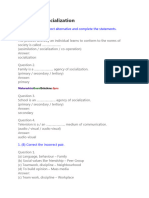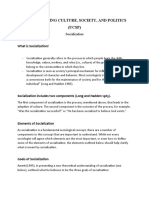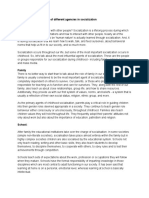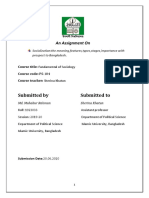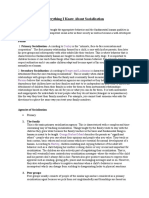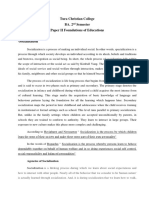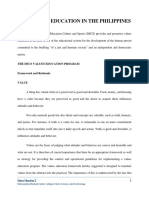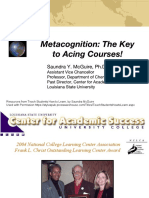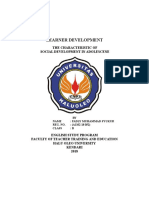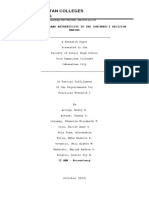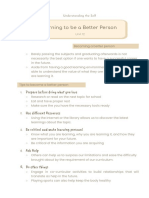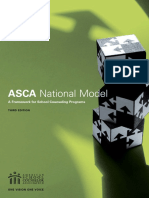SOCIALIZATION (Part B)
AGENTS OR AGENCIES OF THE SOCIALIZATION
The socialization that we receive in childhood has a lasting effect on our ability to interact with others in
society. In this lesson we indentify and discuss four of the most influential agents of socialization in
childhood, family, school, peers, and media.
FAMILY:
There is no better way to start than to talk about the role family in our social development, as family is
usually considered to be the most important agent of socialization. As infants, we are completely
dependent on others to survive. Our parents, or those who play the parent role, are responsible for
teaching us to function and care for ourselves. They along with rest of our family also teach us about our
close relationships, group life and how to share resources. Additionally, they provide us with our first
system of values, norms, and beliefs a system that is usually a reflection of their own social status,
religion, ethnic group and more.
SCHOOLS/MADARSA/MOSQUE:
The next important agent of the childhood socializations is the school. Of course the official purpose of
school is to transfer subject knowledge and teach life skills, such as following directions and meeting,
deadlines. But students don’t just learn from academic curriculum prepared by the teacher and school
administrator. In school, we also learn social skills through our interactions with teachers, staff and
other students, for example we learn the importance of obeying authority and that to be successful, we
must learn to be quiet, to wait and sometimes to act interested even we are not.
PEER GROUP:
Another agent of socialization that relates to school is our peer group, unlike the agents we have already
discussed family and the school, peer group give us an opportunity, as children to form relationship with
others on our own terms, plus learn things without the direction of an adult. Our peers group have an
incredible amount of influence on us when w are young, so it’s understandable that parents worry about
the type the friend we choose. Often we discuss topics and learn behavior norms from our parents don’t
or wouldn’t approve for.
MASS MEDIA
The mass media include many forms of communication such as books, magazines, radio, T.V, that reach
large numbers of people without personal contact between senders and receivers. Since mass media
has enormous effects on our attitudes and behavior notably in regards to aggression, it’s an important
contributor to socialization process. Mass media has an important effect in encouraging individuals to
�support the existing norms and values or oppose or change them. They are the instrument of social
power. They influence us with their messages.
TYPES OF SOCIALIZATION:
Generally, there are 6 types of socialization. PRIMARY, SECONDRY, DEVELOPMENTAL, ANTICIPATORY,
RESOCIALIZATION, REVERSE SOCIALIZATION.
1-PRIMARY SOCIALIZATION.
It refers to socialization of the infant in the earliest years of his life. It a process by which the infant
learns language and cognitive skills, internalizes norms and values.
Example: a child hears his father talk bad words against an old lady. The child would think that this
behavior is socially acceptable, so he would start talking bad words against older people.
Eating with right hand, how to behave are the examples of primary socialization.
2-SECONDRY SOCIALIZATION.
It takes place outside the home. It usually begins when a child is about 5 and has just started school and
where he can make new friend and adults as well and they have many influences that are the opposite
of primary socialization. It s also formal socialization done by people that are setting out to make us
learn the norm of society. For example; entering in new profession, relocating to a new environment or
society, meet new peoples.
ANTICIPATORY SOCIALIZATION:
This stage occurs in between the childhood and adulthood. Adolescence begins to establish
independence from their parents. During this stage adolescence participate in anticipatory socialization.
They not only learn their immediate group culture but also learn the culture of a group which they are
expecting to join in future. FOR EXAMPLE: socialization includes law school students learning how to
behave like lawyers, older people preparing for retirement.
PROFESSIONAL OR DEVELOPMENTAL SOCIALIZATION:
Developmental socialization occurs during the adulthood. This type of socialization is dependent on the
primary and anticipatory socialization. In the early two stages an individual has acquired the skills,
developed his attitude and established the goals for future, which have prepared him for the position
which he is likely to hold as an adult. As an adult individual is encountered with new situations and roles
such as, marriage, job, husband and employee or employer, which will require new expectation and
obligations. In this stage new learning combines with old to continue the process of developmental or
professional socialization.
�FOR EXAMPLE: a shy senior high school student starts to teach English to new fresh men students in
order to develop verbal communication.
RE-SOCIALIZATION:
Sometime when an individual changes his group and become a part of new group he has to abandon his
old way of life. Such situations compel an individual to abandon the old values, norms and beliefs. To
adjust in a new group he has to learn the values norms and beliefs of new group. The process of learning
a new ways of life is called re-socialization.
For EXAMPLE: when a criminal is rehabilited, he has to change his role radically.
Moving to another country and learning new norms.
REVERSE SOCIALIZATION:
IN reverse socialization the younger generation transfer knowledge to the old generation this occurs
mostly in industrial society where the pass of technological change is very rapid.
EXAMPLE: a child teaching a grandparent to use a computer




















